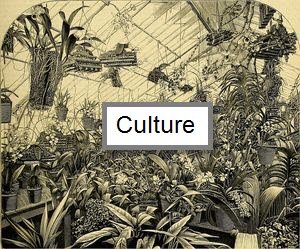Summer is the time when you can easily repot your orchids. During this time intense growing is seen in most orchids, especially in the rainfed areas. This is also the time when the orchids get attacked by many pests and diseases. The climatic conditions are quite congenial for the orchids to easily recover the shifting and can adjust quickly to the new container.
However, repotting should be done only when it is really required. I pointing this out because the orchids, or any other plant, get stressed when these are removed and put into a new container. After shifting, the orchid-especially the roots, need some time to get accustomed to the new settings.
Why do we need to repot the orchid
The repotting of orchids should be done in case the orchid has:
• outgrown the pot or the container. In the terrestrials it would mean that the roots are creeping out of the soil or there is no space left for the orchid to grow further.
• outgrown the growing medium, with the roots not getting enough medium to grow into. With time the growth medium deteriorates, it decays and tends to accumulate pests.
• developed some rotten or diseased parts, which need to be removed.
When to repot
• Timing of repotting the orchid should correspond with the active growing season of that orchid.
• You have sufficient time to keep tabs on the orchid to check for signs of the orchid not coping well with the repotting.
How to repot the orchid
• Select a clean area where you can repot the orchid easily. You can do it on a raised platform, a table or if you have no problem sitting on your heels or haunches, then on the ground.
• Spread a newspaper over the area where you will be working. The white background will be helpful to check the roots for pests and anything out of normal. It would be easier to clean after you are done .
• When repotting a terrestrial: hold the pot sideways and knock on the sides, to loosen the soil inside. If the orchid is growing in a clay pot, you can break of the pot and safely remove the orchid. Never pull the orchid forcefully out of the pot. This may not only damage the roots but there are chances that the orchid may break into two halves, with the top half in your hands! I have done that once. Keep tapping gently on the sides of the pot, till you can see the soil loosen up inside and the orchid can be smoothly pulled out without use of muscle power.
• When repotting a epiphyte: Remove the degraded growth medium. Check for any dried or rotting parts, remove these. Add new growth medium in the basket and place the cleaned orchid in it.
Taking care of the repotted orchid
After shifting you need to take special care of the orchid.
• Do not over water the orchid
• Keep the new potted orchid in shade for some time
• Do not fertilize or add manure to it
• Keep checking for any signs of stress for about a week. The orchid has adjusted well if you see new growth sprouting out.

Re-Potting Your Orchids
Cultureby Anu Dharmani
Originally published in BellaOnline
Posted by Sys Admin about 9 years ago.Article Blog Article Index
Share on Social Media:
New Topics
- Al Schotz asked question Gomesa bifolia in category General Discussion
- Kjell Meershoek started topic Re-inventing an orchidarium.. your thoughts in category Curiosity
- David George asked question Odom's Fascination - an unusual orchid in category General Discussion
- Carol Holdren asked question Grow Tent in the Garage in category General Discussion
- David George asked question rlc Caotan Beauty found at Home Depot in category Cattleya Alliance
New Comments
- Kjell Meershoek commented on topic "Re-inventing an orchidarium.. your thoughts" by Kjell Meershoek
- Inga Kruppa commented on member plant Acacallis cyanea Х Paradisanthus micranthus by Inga Kruppa
- Carol Holdren commented on topic "rlc Caotan Beauty found at Home Depot " by David George
- Carol Holdren commented on topic "Odom's Fascination - an unusual orchid" by David George
- Dr. Florian Wolf commented on topic "Wild. Lisa Devos" by Maria Fernandez
- Michael Valcarcel commented on member plant Rlc. Chief Takanaka by Walceli Muniz Valverde
- Michael Valcarcel commented on member plant Rlc. Montana Spirit by Michael Valcarcel
- Michael Valcarcel commented on member plant Ctt. Blazing Sun by Michael Valcarcel
- Michael Valcarcel commented on member plant Bc. Spotted Clown by Michael Valcarcel
- Maria Skrypnyk commented on member plant Yamadara Redland Sunset by Maria Skrypnyk
- André Pessina commented on topic "Odontocidium Orchid fungus?" by Kristin Dorris
- Linda Hartman commented on topic "Image of a plant please" by Leshya Perkins
- Paul Reavis commented on orchid Milt. Kismet
- Christiaan Viljoen commented on member plant Psh. fragrans by Christiaan Viljoen
- Christiaan Viljoen commented on member plant Z. maculatum by Christiaan Viljoen
- Christiaan Viljoen commented on member plant C. Gaskell-Pumila 'Azure Star' by Christiaan Viljoen
- Robert H. Findlay commented on member plant Rlc. Joy Sokabe var. Volcano Queen by Sally K
- James Lunsford commented on member plant Lc. Sagarik Wax 'African Beauty AMO/AOS x Blc. Cherry Suisse'Kauai' HCC/AOS var. Cattlyea 'Hybrid ' by James Lunsford
- John Varigos commented on orchid Bulb. schwarzii
- Linda Hartman commented on topic "Issue with Blc. Ben O'Neil "Jubilee" by Glenda Ratliff